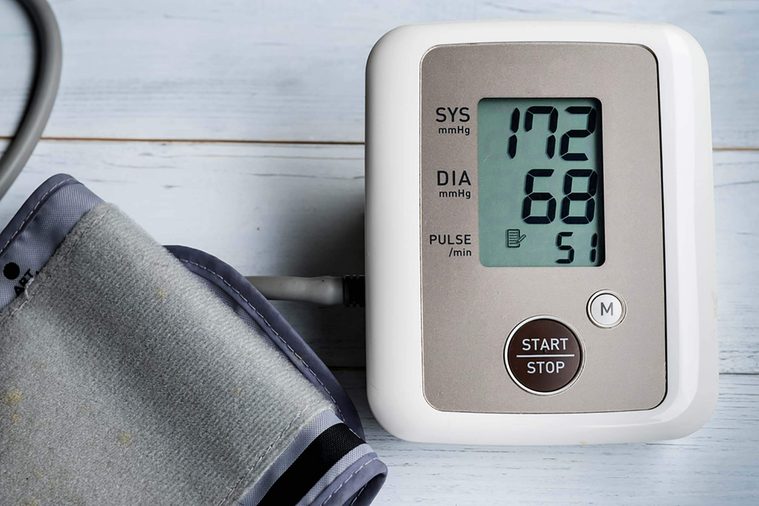
Body kicks into fight or flight mode
The “fight or flight response” is our body’s primitive, innate response that prepares it in case of a threat or attack to our survival. This natural reaction isn’t just triggered by physical circumstances; it can also be sparked with emotional or mental trauma. According to Erika Martinez, Psy.D., “A breakup is perceived as a stressor by the body, and the body doesn’t distinguish whether that stressor comes in the form of a broken heart or a lion chasing you. The body will respond to both in the same way; this response includes shakiness/trembling, poor concentration, and intrusive thoughts. While the stress of a threat posed by a lion is transient, the stress resulting from a breakup lasts longer and can lead to chronic anxiety, and if left unaddressed, into depression.” (Is relationship PTSD possible? Learn what it is and how to cope.)

Changes occur in sleep and appetite
Blame this one on your pesky hormones. The hallmark of mental distress is the physical symptoms of significant sleep and appetite changes. Because breakups fall under long-term stressors, releases of cortisol divert blood from the digestive system, causing it to slow down and incite conditions such as irritable bowel syndrome (IBS). As a result, you’re more likely to either over or under eat or resort to splurging on “comfort food” to cope. And that’s not all. “Sleep can be also be seriously impacted. Insomnia or hypersomnia are common with the loss of a significant relationship, and these can lead to other physical health issues like headaches, low energy, low motivation, anxiety, greater stress, and depression,” says Christina Hibbert, clinical psychologist, speaker, and author of Who Am I Without You: 52 Ways to Rebuild Self-Esteem After a Breakup.

Releases of dopamine register intense cravings
A 2011 study by researchers at Columbia University showed that when you are undergoing a breakup and intensely miss something that was once an integral part of your life, those feelings will register as a craving. Interestingly, the parts of the brain that are affected are the same ones that are stimulated when cocaine addicts experience withdrawal. Jenev Caddell, psychologist and couples therapist, offers some insight on this phenomenon: “Among people in love, there is increased activity in the region of the brain that produces the neurotransmitter dopamine, which is highly related to the brain/body’s reward system. After a breakup, this area of your brain ALSO gets activated, so you may be likely to obsess about the person, without any rewards.” (This is the type of breakup that hurts the most.)

Your immune system gets weaker
Ever heard of people relating breakups to being “hit by a truck”? If you think breakups physically hurt, you’re not just imagining it. Heartbreak will take a physical toll on your body by shutting down certain parts of the immune system that help combat viruses. According to Caddell, “Stress hormones are released, which over time can lead to decreased immune functioning and a lot of other health problems. Your body is essentially weaker after a breakup, and you may be more sensitive to physical pain as well. People describe breakups with physical metaphors because you really can feel physically hurt as a result; it’s all connected.”

Cortisol and blood pressure levels skyrocket
Cortisol is the stress hormone that is released when we undergo any sort of stressful situation. Upon the dissolution of a romantic relationship, Hibbert tells us that cortisol activates our sympathetic nervous system, enabling us to tackle the stressor. The downfall? It tackles it by increasing heart rate and blood pressure. “The problem with a breakup is it’s a long-term stressor, and that cortisol sticks around much longer than is helpful, causing anxiety, worry, fear, physical exhaustion, and other possible symptoms.” (Learn the things you should never do to get over a breakup.)

Your skin breaks out
Seems like everything causes acne these days, and unfortunately a breakup could mean a breakout. In a 2007 study by Wake Forest, researchers discovered that acne is 23 percent more likely to happen when people are experiencing high levels of stress (such as a recent split). They paid pretty close attention to the alternate variables too; many other acne-inducing factors like weather were regulated in order to ensure nothing muddled with their results. Their findings undoubtedly proved that stress can indeed provoke inflammation—and acne is an inflammatory disease.

Your heart temporarily enlarges.
Nope, this isn’t figurative. When you’re going through a breakup, your heart literally enlarges in a condition defined by The American Heart Association as broken heart syndrome, something that can lead to cardiovascular repercussions such as heart muscle failure: “A part of your heart temporarily enlarges and doesn’t pump well, while the rest of your heart functions normally or with even more forceful contractions.” This syndrome is way more likely to affect females, with women accounting for over 80 percent of cases. Because symptoms of broken heart syndrome include chest pain and an irregular heartbeat, it is often misdiagnosed as a heart attack. The good news? It will usually clear up in a few weeks and is generally something people only experience once. Ready to get back out there? A dating expert explains the 8 ways to meet new people.
